|
|
|
Sort Order |
|
|
|
Items / Page
|
|
|
|
|
|
|
| Srl | Item |
| 1 |
ID:
134144
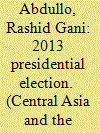

|
|
|
|
|
| Publication |
2014.
|
| Summary/Abstract |
The author looks at the problem of the legitimacy of the 2013 presidential election in Tajikistan as a sine qua non of social and political stability and, consequently, of the country's security and territorial integrity. In Tajikistan's specific case, the election could only be legitimate if the opposition forces, primarily the Islamic Revival Party of Tajikistan (IRP), which comes second after the institution of presidential power as the most influential political force, did not boycott it.
Despite the easily predicted results (another term for President Rakhmon), the IRP leaders decided to take part in the process: an Islamic revival could only take place in a politically stable Tajikistan. To gain public legitimacy for their decision, they organized a series of consultations with representatives of the public to formulate and realize the idea of an Alliance of the Reformist Forces of Tajikistan (ORST), which nominated human rights activist Oinihol Bobonazarova as its joint presidential candidate. She did not run because, after failing to present the necessary number of signatures gathered in her support to the Central Election Commission, she was not registered as a candidate. The IRP leaders abstained from voting, but denied all accusations of boycotting the election.
President Rakhmon, who won the election, and the IRP, which stuck resolutely to its course and was able to keep the Islamic revival going, were both winners. The country benefited the most-the election did not shake the frail stability, while Tajikistan's enemies lost another chance to interfere in its domestic affairs with destructive intentions.
|
|
|
|
|
|
|
|
|
|
|
|
|
|
|
|
| 2 |
ID:
119938
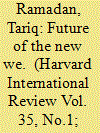

|
|
|
| 3 |
ID:
144899
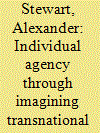

|
|
|
|
|
| Summary/Abstract |
This study examines subjective, social, and transnational aspects of conversion to Islam in modern China by examining the “conversion careers” (Gooren (J Sci Stud Relig 46(3):337–353, 2007), 2010) of seven “new Muslims” who reside in and around Xining, Qinghai Province. Examining their experiences that include pre-conversion socialization, initial encounters with Islam, study of the faith, conversion, and expressions of a new Muslim identity reveals a complex interaction between sociocultural circumstances and individual agency. Rather than gradually succumbing to local ideas of Islamic orthodoxy or passively obeying religious authorities, converts study Islamic texts, form a variety of interpretations, and express their newfound belief in various individual and collective ways that often conflict with social expectations, local Islamic norms, and moral authority of the Chinese state. Converts draw confidence to pursue these conversion careers by believing in the universality of their faith and imagining themselves as part of a transnational community that shares their interpretations of Islam. Thus, conversion to Islam can be seen as compatible with, or even the product of, modern trends of increasing rationality, individual agency, and transnational identity.
|
|
|
|
|
|
|
|
|
|
|
|
|
|
|
|
| 4 |
ID:
164492
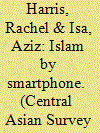

|
|
|
|
|
| Summary/Abstract |
The official Chinese view of the Uyghur Islamic revival is overwhelmingly dominant. Because of the extraordinary measures taken to shield from international view the actual developments in the region and to silence Uyghur voices, we lack a clear sense of what it is to be a Muslim in contemporary Xinjiang. This article explores debates within Uyghur society about faith, politics and identity as they are revealed through the social media platform WeChat. It aims to disrupt the dominant narratives and enable new understandings of the changing patterns of religiosity and violence in the region. It focuses on the use of social media to access affective experiences of religion, projects of self-fashioning, and the new geographies of knowledge and experience formed as Uyghurs turned to the readily available scripts circulating in the wider Islamic world and adapted them to a very local sense of crisis.
|
|
|
|
|
|
|
|
|
|
|
|
|
|
|
|
| 5 |
ID:
066424
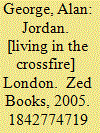

|
|
|
|
|
| Publication |
London, Zed Books, 2005.
|
| Description |
xix, 266p.pbk
|
| Standard Number |
1842774719
|
|
|
|
|
|
|
|
|
|
|
|
Copies: C:1/I:0,R:0,Q:0
Circulation
| Accession# | Call# | Current Location | Status | Policy | Location |
| 050267 | 956.95044/GEO 050267 | Main | On Shelf | General | |
|
|
|
|
| 6 |
ID:
119164
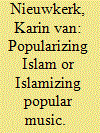

|
|
|
| 7 |
ID:
134120
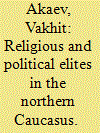

|
|
|
|
|
| Publication |
2014.
|
| Summary/Abstract |
This article highlights the main factors relating to the formation of the religious and political (Islamic) elites in the Northern Caucasus caused by Gorbachev's perestroika, the collapse of the Soviet Union, the reforms conducted in Russia, the creation of an ideological vacuum, and the birth of market relations. The sociocultural context that formed has given rise to an Islamic revival, the penetration of Salafi (Wahhabi) ideas into the region, and the formation of a neo-clergy that is not only claiming a leading role in the religious life of Muslims, but also active participation in politics, right down to preparing a state coup.
|
|
|
|
|
|
|
|
|
|
|
|
|
|
|
|
| 8 |
ID:
084857
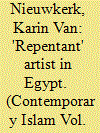

|
|
|
| 9 |
ID:
137512
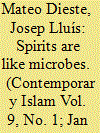

|
|
|
|
|
| Summary/Abstract |
This article analyses the revitalisation of Islamic exorcism in Morocco since the 1990s and how its practitioners legitimise it as a ritual largely adapted to theological orthodoxy. The rhetoric of these exorcists on spirit possession defines certain afflictions as an intromission of the genies (jnun) into the body by physical mechanisms, comparable to the processes undertaken by microbes. From interviews and observation of ritual exorcism of Moroccan faqihs in Tetuan and Barcelona, I analyse their techniques and the way they legitimise them. I conclude that the moral intervention of religious specialists through Koranic recitation becomes effective throughout a dynamic worldview that reinforces old basic assumptions about a physical intercourse between jnun and humans. At the same time, with the revitalisation of the ritual, many Koranic exorcists incorporate new rhetorics to demonstrate scientifically the materiality of the jnun and their effects on the possessed bodies. But Moroccan Koranic healers not only rework definitions of affliction and legitimise the physical agency of the jnun, they also contribute to define gendered experiences of the body as far as women are conceived as the favorite and weakest victims of the genies.
|
|
|
|
|
|
|
|
|
|
|
|
|
|
|
|
| 10 |
ID:
146712
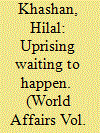

|
|
|
|
|
| Contents |
This paper contends that the Syrian Ba’ath Party’s authoritarian bargain introduced by the late Hafez al-Assad soon after he assumed the presidency in 1971, expired a few years prior to the eruptions of 2011. It demonstrates this termination by examining Syria’s political and social situation as well as the inability of the government to maintain a balance between regime security and the provision of welfare to the public. Despite a decline of welfare benefits, there was no reduction in the application of extreme coercion. Matters worsened with the alliance between the regime and the new urban business class that alienated the countryside, which previously had provided the bulwark against the threat of urban forces of change.
|
|
|
|
|
|
|
|
|
|
|
|
|
|
|
|
|
|
|
|
|